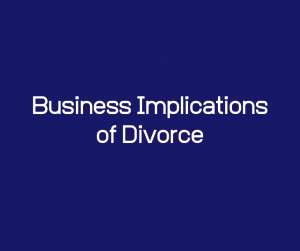Changes to Pennsylvania Custody Statute Include New Requirements for Child Safety
As of August 13, 2024, a number of changes have been made to the custody statute in Pennsylvania, which may impact your current or future child custody matter. The custody statute has always emphasized the physical safety of children, however, now there are further requirements on the court and the parties to best eliminate any true concerns.
If physical abuse is raised as an issue in a custody matter, the burden is on the parent making the allegation to provide evidence to the court. In the event the court finds that abuse has occurred and there is an ongoing risk to the child, the court must order supervised physical custody by a professional or non-professional supervisor. There is a further requirement that the proposed supervisor must be present in the courtroom and execute documentation acknowledging their role and responsibilities.
In addition, the court is required to hold hearings as to the child’s physical safety if a parent or any household member has certain criminal convictions, pending charges, prior interactions with Children and Youth or domestic violence orders. As noted, this applies not only to the parents, but any member of their household. Therefore, it is important to know the background, especially criminal background, of anyone residing with you, even on a temporary basis.
If you are currently engaged in custody litigation or soon will be, please contact the AMM Family Law Department for more information.
Celebrities Have Prenups – Do I Need One Too?
With yet another celebrity divorce making headlines, this time with Joe Jonas and Sophie Turner, there is more buzz on Prenuptial Agreements, as it has been reported that Joe and Sophie have one in effect. Entering into a Prenuptial Agreement is common for celebrities, because they often have a great deal of wealth that they want to protect. Similarly, because of their high income, many will want to limit the alimony awarded to their spouse after a divorce. Last, but not least, celebrities are highly motivated to achieve a prompt resolution in order to avoid their case playing out in the court system – with all the negative publicity that may entail.
So we know that the rich and famous are well advised to utilize Prenuptial Agreements for all of these reasons, but how can you decide if a Prenup is necessary for you?
As is many times the case in legal questions, the best answer is, “it depends”. Prenuptial Agreements are powerful instruments which can protect your assets and help avoid conflicts in the event of a divorce. If you are bringing significant assets into the marriage, or expect to inherit significant assets someday, if you have children from a previous relationship, or if, for any number of reasons, you are concerned to ensure a specific resolution in case of a breakup, a Prenuptial Agreement can provide peace of mind.
OPEN ADOPTION – WHAT IS IT?
In the state of Pennsylvania, there exists the concept of “open adoption.” The term itself sounds a little strange since the purpose of adoption is for the child to become part of a new family that is better able to meet the child’s needs. Why would an adoption be open? The answer is: for a variety of reasons.
One of the main reasons why the Pennsylvania legislature enacted the Act 101 Notice statute (the statute creating open adoptions) was to allow adoptees and adoptive families to have access to the adoptee’s family medical history. 23 Pa. C.S. §2503 specifically states that upon the entry of an order terminating a parent’s parental rights, the court shall advise the parent, in writing, of his/her continuing right to place and update both personal and medical history with the court and the Department of Public Welfare. Being able to obtain an adoptee’s medical history is incredibly beneficial, however, the primary issue with this statute is that it requires the biological parents to provide and update their medical information, which generally does not happen.
What to Expect in Your Initial Meeting with a Family Law Attorney
Making the decision to contact a family law attorney to address your legal issues is understandably stressful, and can add anxiety to the already painful concerns that have prompted your need for representation and legal advice. Whether your matter is related to divorce, child custody, child support, spousal support, alimony pendente lite, alimony, or equitable distribution matters, knowing in advance what to expect can help you be prepared and raise your comfort level. The information provided here will hopefully take some of the mystery and worry out of taking that first step: the consultation.
Don't be a Grinch - Make the Holidays Enjoyable for Your Children Post Separation
The holiday season is in full swing with Thanksgiving and Hanukkah already passed and Christmas, Kwanzaa and New Year’s rapidly approaching. What is supposed to be a happy and festive time of the year can feel anything but for parents who are separated or divorced and their children. Here are some suggestions for making the season more enjoyable and stress free - the greatest gift of all.
Children often struggle to enjoy the holidays if they know that the other parent is sad because they will not be together. If the holiday is not your day with the child(ren), you can help by making it clear to them that you are happy for them to celebrate with the other parent and that you will be ok. Even if you are having a hard time, do not put that burden on the children. You can certainly let your friends know that this is a tough time for you and reach out to them for support, but do not let your child(ren) know. Make some plans, even if it is just a movie marathon at home or finishing that book that you have been reading, so that your children know you have plans and are looking forward to the holiday.
Holiday Custody Planning: The Time is Now
While it is not yet Halloween, it is already time to starting thinking about your winter holiday custody schedule. Thanksgiving is only about a month away followed in December by Hanukkah, Christmas and Kwanzaa. Now is the time to take out your Custody Order to determine what the schedule is for this year. If you do not have a Custody Order or agreement, now is the time to start having a discussion with your child’s other parent to determine a holiday custody schedule. If you cannot resolve any disputes, now is the time to have the discussions and if necessary, file to have the courts assist in making a decision. If you wait until the eve of the holiday, it may very well be too late.
In addition to the actual schedule, now is also the time to start having discussions as to whether there will be any travel involved and who else will be at any holiday celebrations. While these may not be issues in most years, travel and who is at the holiday celebrations may very well be at issue in the age of COVID. These issues, along with the actual custody schedule, should be worked out well in advance of the holiday.
Finalizing the holiday custody schedule now will allow you all to have a much more enjoyable and less stressful holiday season.
Business Implications of Divorce
When a business owner gets divorced, the business is often the major asset subject to distribution. Accordingly, the business and its’ ongoing operations are almost always implicated in the divorce. In most cases that I see, the business is a small business with one owner or a few owners. In the best case scenario, the business owners have planned in advance for situations that arise in a divorce through a Shareholders Agreement, Prenuptial Agreements and/or Postnuptial Agreements. Hopefully, the parties’ respective family law and business law attorneys can work together to best protect the business owner to ensure as smooth a transition as possible. Hopefully, the relevant agreements have set forth a valuation formula which can be upheld at law for purposes of the divorce. Counsel can also work together to insure that income is clearly defined and reported so that support is less contentious. Additionally, advance planning can be used to address the below issues so that a divorce does not mean the end to the business. While advance planning is not a guarantee, it will provide additional protections to the business owner.
A divorce can impact internal and external business relationships, support (between spouses and child support), equitable distribution (division of marital property) and business control. In terms of business relationships, banking relationships can come into play, especially if the spouse is a personal guarantee of the loan. It is often not easy or possible to have the spouse removed from the guarantee. The spouse may also have a role in the business and it may not be feasible for them to remain involved. For example, in cases where the spouse is client facing, a delicate balance will be necessary to transition the spouse out of the business without negatively impacting the business. This can be a challenge if the divorce is acrimonious. Finally, the roles of the parties within the business may create sustainability issues going forward. In some cases, one spouse has a particular talent (i.e. software development, marketing creativity or scientific knowledge) which cannot be easily replaced and without which the business may not be able to survive. Such issues impact valuation but also succession and strategy on distribution of assets.
As for support, when a business owner is a party to a support action, whether for support for a spouse or for a child, calculating income can be challenging. The definition of income for purposes of determining support is very broad and is not the same as taxable income. There can be practical issues in obtaining information and documents which reflect the income. Legal issues can also arise, such as whether income is being reported or if the court can compel income or retained earnings to be distributed from the business to the owner to pay support.
In equitable distribution, the business must be valued so that division of the assets can occur. Business control also comes into play. It is unusual for parties to retain joint ownership or for the non-business owner spouse to receive shares of the business so creativity and/or structured payments are often necessary unless there is enough cash reserved for an outright payment. The payout can cause a financial strain for the business.
To best protect a business in the event of a divorce of the business owner, it is advisable for business owners to have advance planning through the mechanisms listed above. While not a guarantee, it will place the business owner spouse in a much better position than ignoring these issues all together.
Medical Marijuana and Child Custody Cases in Pennsylvania
In Pennsylvania, the paramount concern in a child custody proceeding is the best interest of the child. In determining the best interest of the child, courts engage in a comprehensive analysis of the factors outlined in 23 Pa.C.S.A. § 5328. Pennsylvania Health and Safety Statute §10231.2013 states that the use of medical marijuana in accordance with state laws is not a consideration by itself in a custody case. The custody laws have not been amended to address the issue or make similar limitations regarding the use of medical marijuana by a parent.
On December 18, 2019, however, the Superior Court of Pennsylvania issued an opinion affirming an April 5, 2019 Schuylkill County Court of Common Pleas decision limiting self-represented Father’s contact with son, age 10, to periods of supervised physical custody. The case involves a child born in May of 2009 to Mother and Father, both who have struggled with substance abuse. The court noted that Father’s recreational use of marijuana has been a recurring issue throughout the custody litigation. Father obtained a medical marijuana license when the parties were living in Georgia. At the time of the hearing, the child’s maternal grandparents had primary physical custody of the child. The trial court had awarded maternal grandparents primary physical custody of the child adding a provision that conditionally extinguished Father’s supervised custodial time “upon Father’s willingness to demonstrate sobriety and continued abstinence.”
Father argued that in light of his license to use medical marijuana as a mechanism to manage his wrist pain, the trial court should not weigh the fact of his medical use against him. The trial court rejected Father’s argument and reinstated the prior custody arrangement and the hair-follicle-testing condition. The trial court reasoned that it is unknown to the Court what effect, if any, Father’s alleged medical condition and use of marijuana, whether prescribed or used recreationally, may have on his ability to care for a child. Father appealed, and the Pennsylvania Superior Court affirmed the trial court’s decision.
The Superior Court noted that the Medical Marijuana Act prohibits the fact-finder from penalizing a parent simply for using medical marijuana. However, in the instant case, the trial court concluded after a consideration of all of the best-interest factors and the evidence presented, that it was not in the child’s best interests to expand Father’s supervised partial custody to unsupervised overnight custody without requiring Father to continue to submit to the previously-ordered drug screening regimen. The Medical Marijuana Act does not preclude the court from making relevant findings concerning effective marijuana use, medical or recreational, on parent’s ability to care for a child. The Superior Court noted that the fact finder should consider not only the parent’s history of drug and alcohol use, but also the parent’s mental health and physical condition that might require the parent to rely on prescribed medication to subdue that pain. The Court concluded that a parent’s history of drug and alcohol abuse, including a parent’s legal use of any substance, should be considered in determining the child’s best interest.
For Children of Divorced or Separated Parents, Your Generosity and Flexibility Makes for a Happier Holiday
The holiday season can be a stressful time of the year, especially for children whose parents have recently separated or have a tense custody arrangement. I often remind my clients to keep in mind that the children have not asked to be put in this position, and parents should do all they can to ensure a happy and stress-free holiday for their children. After all, the children should be the focus in the holiday season. Here are some tips to help reduce tensions for your children over the holiday season .
1. Make it clear to your children that you are genuinely happy for them to spend time with the other parent.
2. Help them make cards and gifts or take them out to buy something for the other parent. It doesn’t have to be extravagant, but this small gesture will go a long way in bringing happiness to your children, and hopefully foster more civility with their other parent. The children will be excited that they have a gift to give, and hopefully the other parent will reciprocate in the future.
3. If your children are having fun at the other parent’s house, spending time with family they haven’t seen in some time, and want extra time with that family, consider allowing them to spend a little extra time before you pick them up, especially if your plans are flexible.
4. Don’t cancel Christmas or Hanukkah. Some parents decide that because they are not going to have their children at a specific time on the holiday, they are not going to celebrate this year. The only ones hurt with this approach are your children, who – after all - did not ask to be subject to a custody order. Make it clear to your children that you were excited to celebrate with them, and that you will be celebrating when they are back at your house. That will also give them peace of mind to enjoy the holiday more when they are with the other parent free of guilt and worry that you are sitting home alone and sad since they are not there with you.
5. Make sure you look at the custody order in advance. If you have any questions make sure to have those questions answered by your attorney or resolved in a discussion with the other parent well in advance to avoid disputes on the eve of the holiday .
If your children see that you are happy to celebrate the holiday, no matter what the schedule is, that will allow them to more fully enjoy the holiday as well.
Wish you and your family a very happy holiday season.
A Post Divorce Checklist: Finish Things the Right Way and Sail Into the Future
The divorce is final. No more deadlines to meet, papers to file or waiting time for all of it to be over. Now that the hard part is behind you, it is time for a fresh start. However, there might be a few things remaining for you to do before you can officially move on to the next chapter.
The following is a checklist of things that you might still need to do after your divorce is finalized:
- Review your divorce decree and create a list of things that you and your former spouse still need to satisfy. It could help if you create a calendar to visualize when certain things are due such as alimony/child support payments or when certain things are scheduled to terminate.
- Divide investment assets and retirement plans according to the terms of the divorce settlement agreement. Dividing a 401(k) or pension will require a Qualified Domestic Relations Order (QDRO). A QDRO is a court order telling the administrators of the retirement plan or the 401(k) how to divide the account. Most QDROs need to be drafted by an attorney or a CPA, signed by you and the former spouse, filed with the court and signed by a judge. If you are the recipient of a portion of your former spouse’s retirement account and you need the QDRO, it is imperative that you follow-up with your attorney to ensure the implementation of the QDRO is done in a timely fashion.
- Update all beneficiary designations with your workplace retirement plans, investment accounts, retirement accounts, trusts, annuities, life insurance, bank accounts, credit cards and any other place you might have listed your former spouse as a beneficiary.
- Obtain your own insurance coverage for your health, automobile, home and life insurance.
- Review your credit report to cancel any joint credit cards and close any joint accounts. Also, look through your credit report for any joint debts that you were not aware of.
- Update your estate planning documents including your will, any trusts, durable and health care power of attorneys. If you never had a will, this is a good time to consider making one.
- Change your emergency contacts with your workplace, doctors, health club, etc.
- If you changed your name back to your maiden name, you will need to notify different agencies. Most importantly, you will need to change your name on your social security card, passport and your driver’s license. You should also consider changing your name on your social media accounts.
- Consider changing your passwords to any emails or online accounts (i.e. Paypal, Facebook, etc.) that you might have shared the access information with your former spouse. Confirm that your spouse isn’t either a signer or authorized user on any of your online accounts.
- After the divorce, your financial circumstances have likely changed. You should consider developing, by yourself or with the help of a professional, a new financial plan for your new life.
Getting these things done might seem a burden now, after all you have been through, but it is necessary to avoid trouble later on. It is better that you go through this checklist and handle these issues as soon as your divorce is finalized to prevent possible future complications.
Once these things are done, you get to close that chapter and enjoy your new life with no worries about unhandled matters left over from the divorce.





























